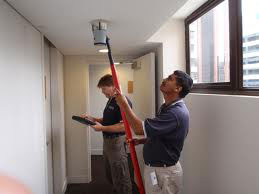
In our last post, we talked about why it’s important to use a third party to test a smoke detector’s sensitivity level. In this post, we’ll cover another area of concern: verification of outputs. In a simple system that just activates the horn/strobes, that may seem to be an easy task. However, there is always more than one output to test in a municipal monitored system, even simple systems. In more complicated systems, there may be many types of outputs. Would in house personnel have the knowledge to test these outputs? Would they even know that they exist? A few questions that need to be answered by testing are:
- Is the city connection reporting properly?
- Is there enough battery backup to operate the system should the facility lose power for an extended period?
- Are smoke dampers, smoke doors, rolling shutters and other types of compartmentalization devices operating when required? Are they fully sealing?
- Are the elevators properly interfaced with the fire alarm system?
- In hospitals, is the birthing and nursery area security interfaced?
- Are speakers producing an intelligible output?
In each of these instances and others, would in house personnel even know to look? Again, full knowledge of how fire alarm systems are integrated with the various building systems, when they should be, or are required to be integrated is knowledge that a reputable fire alarm service agent would have.
Documentation is always top concern of a facility manager with good reason. If documentation is incomplete or inaccurate, fines and a closer look at the facility by the authority having jurisdiction (AHJ) could result. At a minimum, the time lost evaluating the form cited by the AHJ, correcting the mistake and resubmitting documentation takes away from operations management. An experienced fire alarm service agent knows the requirements of the appropriate AHJ and reviews the reports with the client to ensure the report meets requirements and, most importantly, is usable. The documentation is of no use if it cannot be referenced and understood by the owner/chief engineer and the reviewing authority. A testing form straight out of NFPA 72 will most likely be inadequate for anything but the most basic of system. It’s a base and generic form that is used for less complicated systems. A hand written form isn’t going to inspire confidence from the reviewing authority, nor is a form that is missing vital information. This may lead to a more comprehensive site evaluation from the AHJ surveyor, whose job is to ensure compliance. The bottom line is appropriate documentation is easily achieved if the facility manager partners with a reputable firm that foresees their needs and proactively communicates with them.
The cost savings of in-house testing versus third party testing may or may not be relative, depending on the individual nature of each facility. If the facility is large enough to consider in-house testing, then they must weigh the knowledge and experience of third party testing as well as liability aspects the facility must face.
Again, it comes down to selecting the right company to perform this work. Reputable companies are partners that understand their responsibilities and ensure they are met, for their own success as a company as well as for the safety of those that rely on their integrity. Reputable does not mean big. Reputable means responsible, capable and qualified; attributes that can be ascertained during contract negotiations. A reputable company is interested in maintaining safety compliance for their customer as well as limiting their customer’s and their liability exposure. It’s a partnership.
Affiliated Fire Systems has the equipment, expertise and support you need to install, test, inspect and service your fire alarm and emergency voice system. If you have any questions regarding your life safety needs, contact us via our ‘Contact Us’ page on our website, or email me directly at generowe@affiliatedinc.com.


I think it’s a good idea to ask some of these questions when testing fire alarms and emergency voice systems. It seems that checking the city connection, battery backup, compartmentalization devices, and speakers can make a fire alarm much more effective. I can see how failure in any of these features could affect safety for patrons when there’s an emergency.
I think these are all really great things to have checked regularly, but I thought the question about the battery backup was really good. It would be really bad if there wasn’t enough power to initiate a fire system if there was one. I think it’s pretty likely that lack of power and fire could go together like if an earthquake knocked out the power and damage to the building caused a fire. Great stuff on here. Thanks for the info!